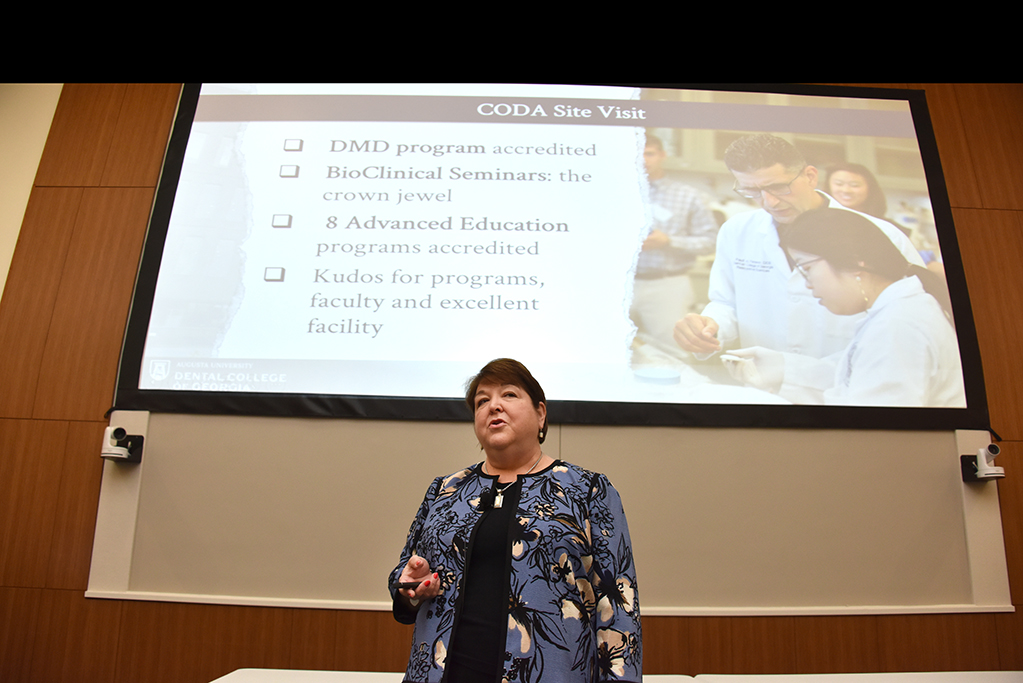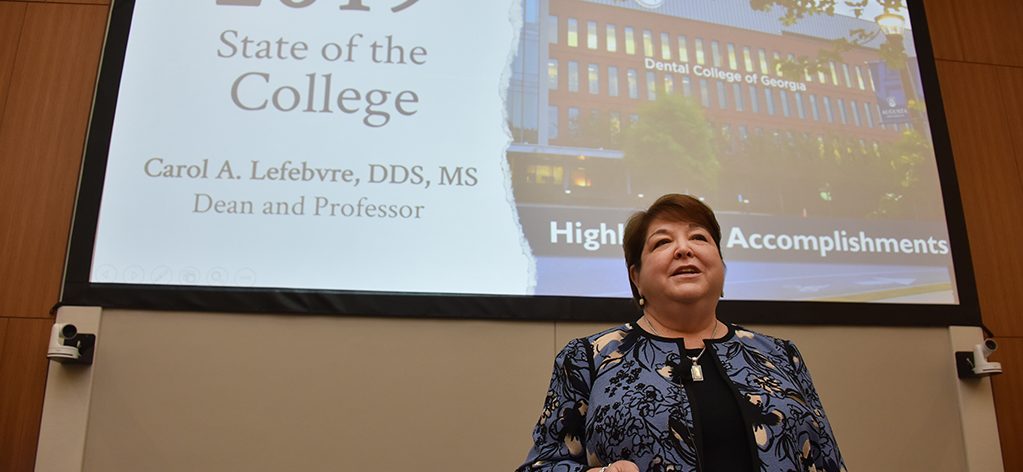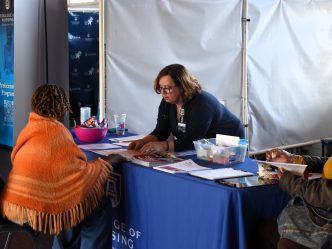Dean Carol Lefebvre began her State of the College address Oct. 23 by celebrating two milestones and many of the Dental College of Georgia’s year-long accomplishments, ending with a continuing challenge to improve research while striving to provide more opportunities for students.
The DCG turned 50 years old this year and had more than 500 people in attendance at the anniversary celebration, including 12 of the 24 members of original Class of 1973. The second milestone was the Commission on Dental Accreditation (CODA) site visit, which occurs every seven years.
“We had our DMD program and all seven of our advanced education programs come through with flying colors,” Lefebvre said. “We received some nice accolades, particularly for the DMD bio-clinical seminars, where we marry the clinical and biological sciences to solve clinical scenarios in a seminar format with faculty representatives from both groups present. We also received accolades for several of our advanced education programs, faculty and facility as well.”
Lefebvre noted that dentistry continues to be a competitive profession. For example, the Class of 2023 received 772 applicants for 96 positions, of which, 202 were interviewed. She also noted this year’s freshman class is 58% female; with next year’s freshman class, they will reach capacity for the facility.
“We’re very proud that 27% of our freshmen dental students come from dental health professional shortage areas,” Lefebvre said, “and we hope that once they earn their degrees, they will return to those communities because the need is high. There are 14 counties in Georgia that don’t have a dentist.”
Lefebvre said they are continuing efforts to expand the diversity of the student class to better reflect the diversity of the population of Georgia. She said 15.6% of the freshman class are underrepresented minority students, equating to 11 African Americans, two Native Americans and two Hispanic students.
“This is something that we’re continually striving to increase,” she said.

Last year, the DCG began implementing digital dentistry across all four years of the curriculum and this year they provided CAD/CAM-enabled laptops at all 100 simulation lab stations and throughout multiple clinics. Lefebvre also said they were beginning to see CAD/CAM in some of the early preclinical courses.
“We’ve incorporated CAD/CAM and digital dentistry in the senior year several years ago. Now, we are trying to integrate across all four years so that when our students leave us, they are prepared for the advances in dentistry.
“Outreach is a big part of what we do. And this is due in large part to the HRSA grants that we’ve received over the last nine years. Last year we provided 19,000 procedures to 11,000 underserved citizens of Georgia.”
The DCG raised $2.4 million last year and awarded $430,000 in student scholarships, which included notable gifts from the Thomas P. Hinman Dental Society, Fisher Foundation and the 50th anniversary scholarship from MCG Foundation, as well as gifts in-kind from Bien Air and Dr. Kirk Kimmerling. There were also two new endowed scholarships: the Akbar Family Scholarship and the Alliance of the GDA Scholarship.
In 2006, when planning for the dental school facility began, they also started planning the surgical center, and Lefebvre said it was Dr. Mark Stevens’ vision to have ORs be able to perform complex procedures on patients who require general sedation at the dental school. This clinic had its ribbon cutting Oct. 25.
Now that the CODA site visit is complete and the revised curriculum is in place, Lefebvre wants to focus on the next 50 years for DCG, and the first step is making sure “we are no longer a best kept secret among dental schools.”
“As I travel around Georgia, I meet people who don’t even know we have a dental school in our state and if they believe we have one, they think it’s in Atlanta,” she said. “We need to collectively get the word out about the great work we do here, and that is accomplished by being involved in the profession, serving on committees and advisory boards and making presentations across the country and internationally, so that people understand who we are and what we do here at Augusta University.”
Lefebvre’s second area of focus is to increase research activities.
“This is a priority not only for our college, but also for our university and we’re making great strides,” she said. “In addition to increasing NIH funding, we have additional research goals. With the change in our curriculum, we want to increase opportunities for our students to be engaged in research, and finally, increase collaboration and expand our areas of focus to include public health.“
Lefebvre expressed appreciation and gratitude for the increase in DCG’s National Institutes of Health funding, saying it is “significantly helping us to enhance our ratings and reputation across the country.”
 Augusta University
Augusta University




